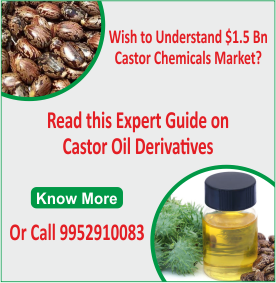Castor Meal, Castor Cake - from The Castor Oil Dictionary
Castor Meal/Cake - from The Castor Oil Dictionary
Castor meal is also variously called castor meal, castor residue, castor extract & de-oiled castor cake
Castor meal - the residue obtained from castor cake by the solvent extraction process - is one of the most versatile natural manures. It is truly an organic manure which enhances the fertility of the soil without causing any damage or decay. It is enriched with the three big elements vital and conducive to the proper growth of crops - Nitrogen, Phosphorus and Potassium. It also has traces of nutrients like Manganese, Zinc and Copper, thus making it a balanced fertiliser. Moreover, it helps to neutralise the detrimental effects of chemical fertilisers. Apart from their contribution to Nutrients , they have a number of benefits in agriculture, which none of the synthetic fertilizers or pesticides can offer. They bring in the wonderful molecules that nature has designed to help the plants flourish naturally. They provide slow and steady nourishment, stimulation , protection from soil nematodes and insects, improve yields, and quality of product like taste, flavour, amino acid composition etc.
The pressed cake obtained after the expression of castor bean. The solvent extracted cake, although rich in protein cannot be used as cattle fodder because of its toxicity. However, it can be used as a fertilizer.
The protein content of castor seed meal varies from 21-48% depending upon the extent of decortications. It has an ideal amino acid profile with moderately high Cystine, mithionine, and isoleucine. But its ant nutritional substances, ricin, ricine and an allergen restrict its use in poultry feed, even at a very low level of inclusion.
Castor Cake is an excellent fertilizer because of high content of N (6.4%), Phosphoric Acid (2.55%) and Potash (1%) and moisture retention.
There is negative correlation between the contents of ricinine in castor seeds and oil content (r = -0.76). This content of ricinine in castor seed is determined by Agro climatic conditions.
Nutrient content of Castor Cake:
Organic matter - 75 - 80 %, Nitrogen - 4.0 - 4.5 %, Phosphorous - 1.5 %, Potassium - 1.25 - 1.5 %.
It also contains some micro nutrients viz., Calcium, Magnesium, Sulphur, Iron, Zinc, Manganese, Copper etc.
A typical composition of castor residue/meal is as follows:
Nitrogen - 4% min. approx.
Phosphourous - 1% min. approx.
Potassium - 1% min. approx.
Moisture - 10 - 12 % max. approx.
Oil Content - 0.7% max. approx.
Advantages:
1. It provides all the major & minor nutrients necessary for better plant growth.
2. It also helps in increasing the nutrient uptake by plants .
3. It improves the soil fertility and productivity.
4. It is known to protect the plants from nematodes and termites.
5. It improves the yield & quality of the farm produce.
6. It improves the physical , chemical and biological properties of soil
Glossary of Castor Oil Terms
Castor Bean, Castor Extract, Castor Meal/Castor Cake, Castor Oil, Castor Oil Chemicals, Castor Oil Derivatives, Castor Oil BP Grade, Castor Oil FSG, Castor Oil Glossary Main Index, Castor Oil USP, Castor Plant, Castor Seed, Commercial Castor Oil, De-oiled Castor Cake, Dehydrated Castor Oil, Deodorised Castor Oil, European Pharmacopia Castor Oil, Hydrogenated Castor Oil, Industrial Castor Oil, Ricinoleic Acid, Sulfonated Castor Oil, Turkey Red Oil
The Castor Oil Dictionary is intended to be a dictionary & glossary resource for castor oil related terms, providing meanings, definition & explanations for these terms and words.








